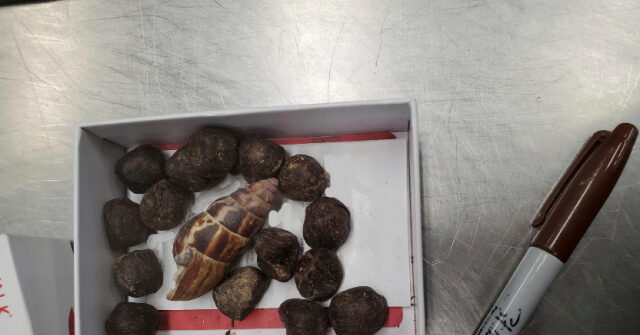U.S. Customs and Border Protection (CBP) officials found something smelly at an airport on September 29 after examining a traveler’s belongings.
The discovery happened at the Minneapolis-Saint Paul International Airport when authorities inspected a small box containing “giraffe fecal matter,” the agency said in a press release Thursday.
An image shows the white box with the droppings and what appears to be a shell nestled inside it:
Federal customs agents pooh-poohed the plans of an Iowa woman who wanted to make jewelry from giraffe feces she picked up on a trip to Kenya and brought back to the U.S. Agriculture specialists seized the small box and destroyed the giraffe poop. https://t.co/6MTswTirfL
— AP Oddities (@AP_Oddities) October 6, 2023
The news release said the passenger was returning from a trip to Kenya and CBP’s agriculture specialists took the woman aside for inspection:
The passenger declared giraffe feces and stated she had obtained the droppings in Kenya and planned to make a necklace. The passenger also stated in the past she had used moose feces at her home in Iowa. Agriculture Specialists seized the box, and the excrement was destroyed via steam sterilization per United States Department of Agriculture (USDA) destruction protocol.
All ruminant animal feces require a Veterinary Services Permit for entry into the United States. Kenya is affected with African Swine Fever, Classical Swine Fever, Newcastle disease, Foot and Mouth disease, and Swine Vesicular Disease.
Social media users were quick to comment on the photo of the feces, one person writing, “Jewelry used to be made with gold.”
“The question is did she know it was poop,” another user replied:
U.S. Customs officials seize giraffe feces from woman at Minnesota airporthttps://t.co/wBR0Jf9LVF pic.twitter.com/aC1IPoXPXh
— The Washington Times (@WashTimes) October 6, 2023
Bringing fecal matter into the United States can be dangerous, according to LaFonda D. Sutton-Burke, who is the CBP Director, Field Operations-Chicago Field Office.
“If this person had entered the U.S. and had not declared these items, there is high possibility a person could have contracted a disease from this jewelry and developed serious health issues,” Sutton-Burke explained.
When it comes to giraffe poop being harmful to people, the A to Z Animals website said, “The majority of animal waste spreads germs and viruses that contaminate food supplies and cause allergic reactions.”
“Poorly handled animal feces can expose humans to infections, especially in areas where animals coexist with people. Acute gastrointestinal symptoms that might result from contact with animal feces are linked to several diseases of zoonotic origin,” the site reads.


